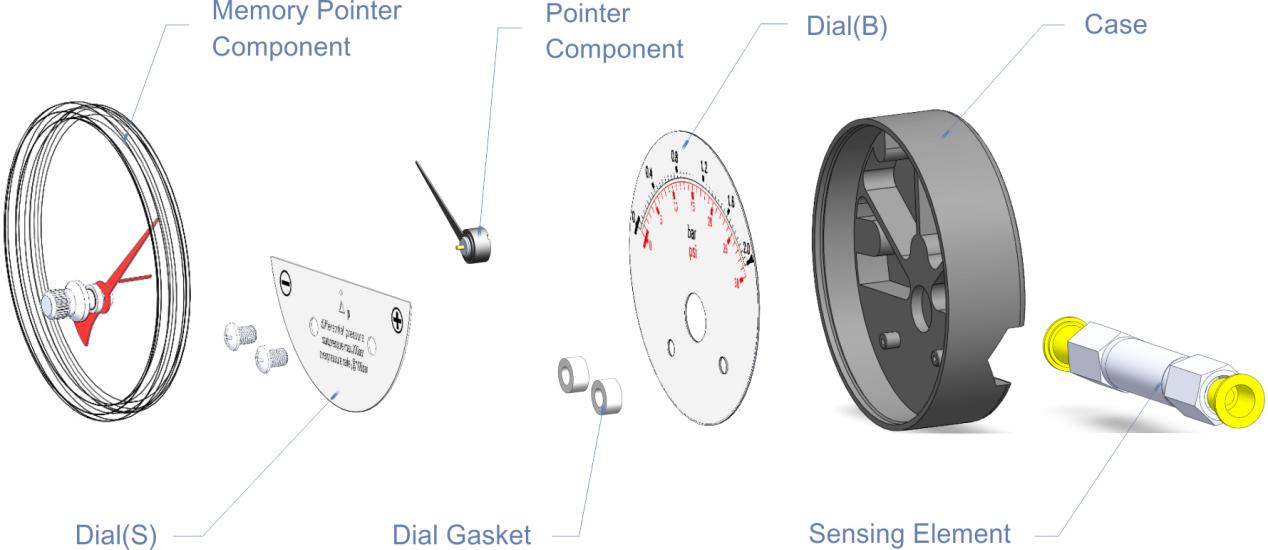
Nov . 24, 2024 07:26 Back to list
differential pressure gauge,
Understanding Differential Pressure Gauges Applications and Importance
Differential pressure gauges are essential instruments used in various industries to measure the difference in pressure between two points in a system. This measurement is critical for a range of applications, from monitoring filtrations in process engineering to ensuring the safe and efficient operation of machinery in HVAC systems. This article explores the working principle of differential pressure gauges, their applications, and why they are indispensable in modern industrial processes.
What is a Differential Pressure Gauge?
A differential pressure gauge is a device that measures the pressure difference between two points in a system. It typically consists of two pressure ports connected to a diaphragm or a series of tubes. When a pressure difference is applied, the diaphragm flexes, and the movement is translated into a readable value, usually displayed as a numerical value on the gauge face.
These gauges can measure either positive or negative pressure differences, making them versatile instruments suitable for various applications. They are available in different types, including mechanical, electronic, and digital gauges, each with its unique features.
How Does It Work?
The basic operating principle of a differential pressure gauge involves sensing the pressure difference between two input ports. When pressure is applied to one port while the other is exposed to a reference pressure (which might be atmospheric pressure or another predetermined point), the resulting deflection is measured and calibrated to display the difference in pressure.
In a mechanical gauge, the movement of the diaphragm is usually transferred through a mechanical linkage to a dial. In contrast, electronic differential pressure gauges convert the mechanical movement into an electrical signal, which can potentially be displayed on a digital screen, making them more suitable for integration into automated systems.
Applications of Differential Pressure Gauges
Differential pressure gauges find applications in a wide range of industries
1. HVAC Systems In heating, ventilation, and air conditioning (HVAC) systems, differential pressure gauges monitor the pressure drop across filters and ducts. This helps in determining when filters need replacement or cleaning, improving system efficiency and air quality.
differential pressure gauge,

2. Process Industry In the chemical and process industry, these gauges are critical in monitoring the pressure drop across reactors, heat exchangers, and distillation columns. The pressure difference can indicate blockages, leaks, or other issues within the system that may compromise safety and operational efficiency.
3. Water Treatment Differential pressure gauges are used to monitor the pressure in filtration systems, ensuring that they operate within designed parameters and indicating the need for maintenance or cleaning when pressure drops exceed preset levels.
4. Pharmaceuticals In pharmaceutical manufacturing, maintaining stringent process controls is vital. Differential pressure gauges help monitor cleanroom environments and ensure that pressure differences between rooms meet safety standards, preventing contamination.
5. Industrial Automation In automated systems, electronic differential pressure gauges can provide real-time data to control systems, allowing for immediate adjustments and enhancing overall process control.
Importance of Differential Pressure Gauges
The importance of differential pressure gauges cannot be overstated. They play a crucial role in
- Safety By continuously monitoring pressure differences, these gauges help detect potential failures or hazardous conditions early, preventing accidents in critical applications.
- Efficiency Ensuring optimal pressure levels can lead to significant energy savings and improved system performance. This is particularly important in industries where efficiency translates directly into cost savings.
- System Integrity Regular monitoring allows for the detection of leaks or other malfunctions, thereby maintaining system integrity and ensuring compliance with industry standards.
In conclusion, differential pressure gauges are vital instruments that contribute to the smooth operation of many industrial systems. Their ability to provide accurate pressure difference measurements enhances safety, efficiency, and operational integrity across various applications. As industries continue to evolve and demand more precise measurements, the role of differential pressure gauges will only grow more significant, making them indispensable tools in modern engineering and manufacturing.
-
Fluke Differential Pressure Gauges Precision Instruments for Industrial Use
NewsMay.25,2025
-
WIKA Differential Pressure Gauge 700.01 - High Accuracy & Durable Design
NewsMay.25,2025
-
Diaphragm Pressure Gauges High-Accuracy & Durable Solutions
NewsMay.25,2025
-
High-Accuracy Differential Pressure Gauge Diaphragms OEM Factories & Services
NewsMay.24,2025
-
Water Fire Extinguisher Pressure Gauge Durable Supplier Solutions
NewsMay.24,2025
-
Handheld Digital Differential Pressure Gauge Portable, High-Accuracy & Real-Time Data
NewsMay.24,2025
